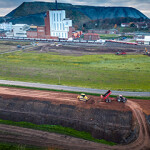Salmon Evolution achieves ASC certification; Kyokuyo joins GSSI

SeafoodSource is closely following the sustainable seafood movement by compiling a regular round-up of sector updates about sustainability initiatives and certifications.
-Salmon Evolution has achieved Aquaculture Stewardship Council (ASC) certification.
The Norwegian salmon farming company, headquartered in Romsdal, Norway, has achieved ASC certification less than a year after its first harvest, the company said in a release.
“Our ASC certification is a testament to the hard work and dedication of our team at Salmon Evolution. We are immensely proud of this achievement, which reaffirms our commitment to sustainability, innovation, and production of premium quality salmon,” Salmon Evolution CEO Trond Håkon Schaug-Pettersen said.
The certification assures the salmon produced by Salmon Evolution has been farmed with high standards of quality, traceability, and sustainability practices, the company said.
“Our ASC certification opens new doors and opportunities to serve our customers better. It’s a testament to our commitment to delivering high-quality salmon that meets and exceeds their expectations while upholding our environmental responsibility,” Salmon Evolution CCO Odd Frode Roaldsnes said in a release.
- Tokyo, Japan-based seafood supplier Kyokuyo has joined The Global Sustainable Seafood Initiative (GSSI) as a funding partner.
“As a company that operates globally and promotes the sustainable use of fisheries resources, we are happy to partner with GSSI and support the organization's activities. We look forward to working with the various domestic and international companies and organizations participating in GSSI, to promote the spread of sustainable seafood,” the company said in a release.
- On 24 October, the Papua New Guinea Torres Strait tropical rock lobster fishery announced it has achieved Marine Stewardship Council (MSC) certification. This is the first small-scale fishery in Papua New Guinea to achieve MSC certification, according to the MSC.
“The leadership shown by Papua New Guinea’s Torres Strait tropical rock lobster fishery should be emulated around the world as a benchmark that meeting world-class standards is not only achievable for small-scale fisheries but necessary. By embracing traditional and sustainable fishing practices, these communities are not only securing their future but protecting a vital part of our planet’s ecosystem,” MSC Program Director for Singapore and Oceana Anne Gabriel said in a release.
-The Soil Association has announced an upcoming public consultation period in late November covering the revision of its organic aquaculture standards.
In 2024, the Soil Association will begin its review of organic certification of fish species other than Atlantic salmon, and will respond to expected developments in legislation surrounding aquaculture and the Scottish government, the organization said in a release.
“Organic farmers are pioneers in sustainable food production, and our standards must allow us to remain at the leading edge of best practice,” Soil Association Head of Standards Chris Atkinson said. “As part of our policy to constantly keep all organic standards under review, we are proposing an update to our aquaculture standards to align them with the most recent research and updates to organic standards across Europe. We are seeking the views of anyone with an interest in the fish sector and sustainable food production to get involved with the consultation and to help us to ensure organic continues to drive forward standards of fish farming in the U.K.”
The Soil Association is a Bristol, England-based certification organization focusing on campaign work on issues opposing intensive farming, organic food, and improving fishing practices. The organization currently has more than 27,000 members.
Photo courtesy of Salmon Evolution





Share